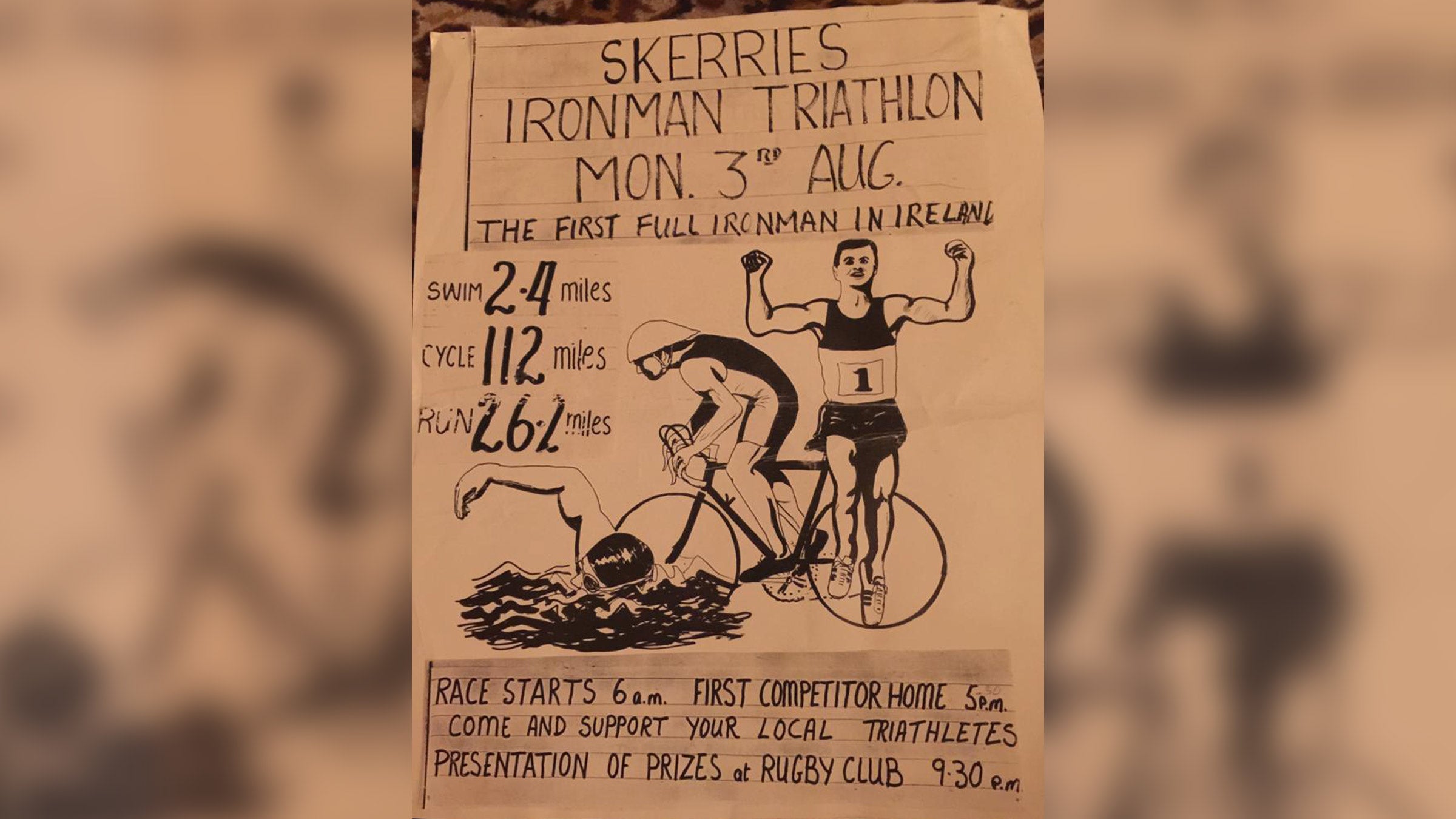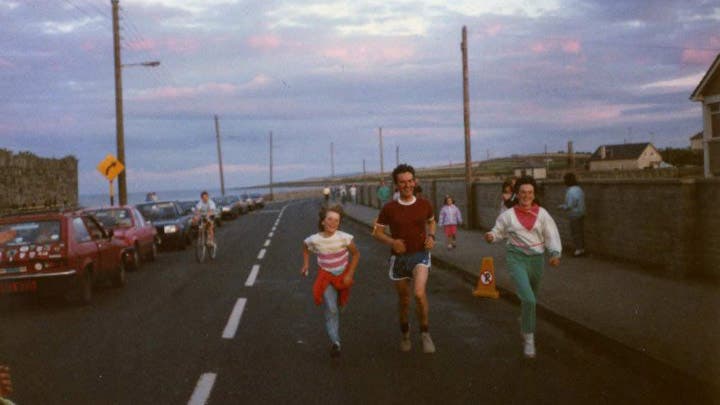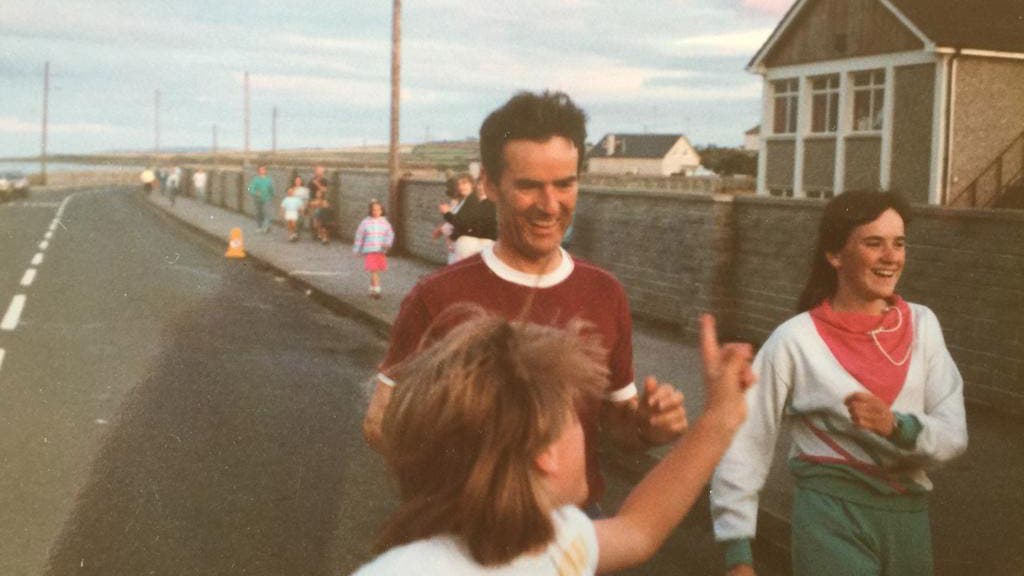Recalled: Ireland’s Father of Triathlon

(Photo: courtesy of Deirdre Mullins)
In 1983, Maurice Mullins, a 41-year-old Irish man set out to do something no one had ever done before in his country: Stage a triathlon. At the time, Mullins was already embedded deep in the ultra-running world after setting a modest goal of running “a few miles every day.” That goal turned into a full-on running addiction, leading Mullins to compete in epic feats, like the Western States 100-miler in California and running from Cork to Dublin–a 160-mile route. It was this thrill of going long and gutting it out for hours that eventually piqued his interest in triathlon. That, and an article in Runner’s World.
“I was subscribing to Runner’s World, the American magazine, at the time and I had been reading about the Hawaii triathlon,” Mullins told The Times of London in 2012. “There were very few others back then, maybe a couple in California, so I decided we should give it a go here.”
By then, putting on a race was old hat for Mullins, who had already helmed a 5K charity running event in his hometown of Skerries, a seaside fishing village north of Dublin. But triathlon was a different beast. It was 1983, after all, and the swim, then bike, and then run concept was something most folks had never even heard of.
But Mullins, a secondary school teacher, had an uncanny ability to convince people to do hard things. Maybe because he consistently raised the bar in his own athletic endeavors, inspiring others to do the same. Or maybe because he had an affable, quirky personality, making it hard to say no to his ideas, no matter how cockamamie they may have been. So, in August of 1983, he pulled off the Republic of Ireland’s very first triathlon. About 50 people turned up, and it sparked an annual tradition in Skerries that persists to this day.
After a few years of modest success with his Olympic-distance race, Mullins decided to bump things up a notch with Ireland’s first Ironman-distance race in 1987. By then, the Ironman race had taken off in the United States, and Mullins–always the endurance devotee–wanted to bring it to the Emerald Isle. He didn’t have the backing of a major corporation or much of any backing at all. His daughter, Deirdre, recalls her father rallying family and friends to volunteer, holding planning meetings around the dining room table in their modest, four-bedroom home in Skerries. Only 11 people signed up, but it would be enough to pull it off.
“I remember the day before the race, our yard was full of bags, and my job was to label the swim caps and divvy up the stuff,” recalled Deirdre, the youngest of Mullins’ four children. “My sister drew the race poster. He got everyone involved, down to me, his 10-year-0ld daughter.”
And Mullins wasn’t organizing the event: He competed in it, too. As if there was even a question–Mullins was never one to miss an opportunity to join a sufferfest. At 4:30 on race morning, Mullins left his house and went out to the Skerries harbor shrouded in darkness to place the buoys for the swim before tending to other typical event director duties. Finally, he stripped down to his bathing suit to start his own race.

“I don’t think he slept at all the night before, with all that he had going on,” said Deirdre. “That didn’t stop him from competing. He trained hard for that race.”
Mullins wasn’t the fastest (that honor went to Dubliner Paul Emmett in a time of 11 hours, 57 minutes, and 15 seconds). But he was likely the most celebrated competitor of the day. When the fine-boned, thinly built man with two dark slashes for eyebrows and a wry smile crossed the finish line flanked by daughters Deirdre and Maeve, the crowd erupted in cheers.
“You would have thought he won the thing,” Deirdre Mullins said. “People showed appreciation that he was the one who had brought the whole thing together.”
Mullins passed away from a lengthy battle with prostate cancer in December of 2015. By that time, his race director days were squarely tucked away in his past, as he went on to focus more on ultra running. But to this day, he is known as Ireland’s “father of triathlon” and a key influencer behind the rapid growth of the sport in the country throughout the late 1980s and 1990s.
“I suppose someone would have come along eventually with the same idea,” said Deirdre. “But it was just like my dad to start something that no one had ever even thought of before. He was always hatching these great plans and ways of bringing the community together. He had a way like that.”
Prior to his death, Deirdre captured the essence of her eccentric father in Going the Distance, a short film which went on to win the “Audience Award” at the 2013 Dingle International Film Festival. In the beginning of the 12-minute short, Mullins–then 71 and unable to run as the disease had spread to his spine–is shown pedaling away on a bike trainer in his backyard shed. Through frail and hallowed cheeked from chemotherapy, a twinkle remains in his eyes as he waxes poetic on the parallels between endurance sports and life.
“When you’re out there running for 12 hours and know you’ve got 12 hours ahead of you, you pitch your sights in the distance,” he said of staying the course. “You’re [constantly] working up to your reward, and it’s a beautiful thing.”
